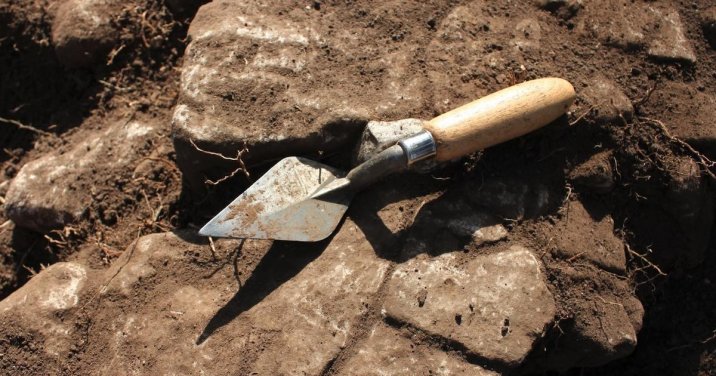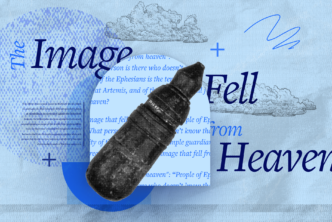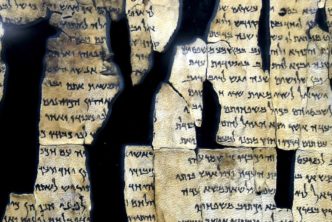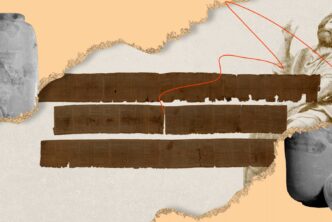Biblical archaeology is archaeology focused on the ancient Near East. It includes places like modern-day Israel, Jordan, Syria, Turkey, Egypt, Iraq, and Iran from 1,400 BC through the first century AD.
And though students of the Bible often overlook archaeology, it’s one of our most significant partners in Bible study—a witness to the events, culture, and people in the Bible’s stories.
Though not everyone will have the chance to go on a dig, there are unique benefits (and I believe blessings) that come from studying biblical archaeology.
Here are four.
1. Biblical archaeology confirms the history of the Bible is sound.
Biblical archaeology provides a tangible background to the stories we can only read and wonder about in the Bible.
Numerous passages of the Bible [that] long puzzled the commentators have readily yielded up their meaning when new light from archaeological discoveries has been focused on them. In other words, archaeology illuminates the text of the Scriptures and so makes valuable contributions to the fields of biblical interpretation and exegesis
For example, after leaving Nazareth, Matthew 4:13 says Jesus “came and settled in Capernaum,” and Mark tells us that when Jesus returned to Capernaum (likely after retreating for a few days), “it was heard that he was at home.” From Mark 1:29–34, it seems most likely that Jesus’ “home” was a room in Peter’s mother-in-law’s home used for extended families.1
Archaeologists have found the remains of such rooms in Capernaum, along with Roman pottery and coins dating to the first century BC. Their characteristics fit with details contained in the gospel accounts:
They are designed for communal rather than private living, and their crowded layout must have made privacy impossible, hence Jesus’ need to go out of the town to be alone (Mark 1:35, etc.).2
Though these types of discoveries give evidence for the existence of people, events, and places described in ancient narratives, they don’t “prove” the Bible—nothing can prove or disprove the Word of God.
But they can—and do—confirm the Bible’s historicity.
2. Biblical archaeology illuminates the biblical text.
Biblical archaeology brings us into physical contact with the cultures in which Jesus and his apostles lived and ministered. Ancient customs, places, even articles used in everyday life can shed light on things Jesus and his contemporaries are reported to have said or done:3
We do not live in the world of the Bible. . . . We cannot anymore correctly reconstruct the customs of the patriarchs from local Bedouin tribes than we can the practices of first-century Judaism from the later traditions of the Jewish rabbis. We must have data directly from the times and places of the biblical world. . . . The details of daily life, society, culture, and religion these archaeological discoveries have given us enable biblical students to understand the ancient context with greater clarity than at any previous time in history (since biblical times).4
Systematic recordings of archaeological findings provide information on the lives of those who lived in biblical times. They give us “a more specific spatial-temporal-cultural context for events and activities, much of which the biblical narratives do not supply,”5 and bring the black and white text in our Bibles into color.
3. Biblical archaeology helps you do better exegesis.
One rule for biblical interpretation is “every text must have a context.” The problem for most twenty-first-century Bible students is the centuries-wide gap between us and the culture and context of biblical stories.
It’s the archaeologist’s job to excavate and collect material data about the past, but these artifacts don’t speak for themselves. Without interpretation, archaeology becomes “[no] more than treasure hunting.”6
But we can take what they uncover, these “treasures” that aid in the accurate translation and interpretation of a text, to do better exegesis:
Numerous passages of the Bible [that] long puzzled the commentators have readily yielded up their meaning when new light from archaeological discoveries has been focused on them. In other words, archaeology illuminates the text of the Scriptures and so makes valuable contributions to the fields of biblical interpretation and exegesis.7
A better understanding of the way people lived in biblical times helps to bring new or deeper levels of understanding to a text and thus makes you a better Bible student.
4. It will strengthen your faith.
Concrete, historical records give faith an environment in which to mature.
Each discovery that confirms the accuracy and existence of events, people, and other details helps the Christian to believe in things that have little or no archaeological evidence—like miracles, heaven, or hell.
Faith becomes less “blind.”
And ultimately, it gives us a more solid defense of the biblical narrative and the gospel.
This should spur us on to stand firm as we wait for the most important intangible reality of all, “our blessed hope, the appearing of the glory of our great God and Savior Jesus Christ” (Titus 2:13).
***
For more information on biblical archaeology, I recommend Archaeology of the Land of the Bible (3 vols.). Or get The Bible in Its World: The Bible and Archaeology Today for 37% off, now on Pre-Pub.
The author’s views do not necessarily represent those of Faithlife.
Karen Engle received her MA in Biblical Studies and Theology from Western Seminary. She is an editor for Faithlife and regularly takes groups to Israel.
- McDowell, Josh. He Walked Among Us: Evidence for the Historical Jesus. (Thomas Nelson, 1993), 216.
- McDowell, He Walked, 216.
- McDowell, He Walked, 216.
- Price, Randall. Handbook of Biblical Archaeology. (Zondervan Academic, 2017), 29.
- Dever, William G. “What Archaeology Can Contribute to an Understanding of the Bible,” Biblical Archaeology Review 7, no. 5 (1981): 40–41.
- Bunimovitz, Shlomo. “How Mute Stones Speak: Interpreting What We Dig Up,” Biblical Archaeology Review 21, no. 2 (1995): 58–67, 96.
- Free, Joseph P. Archaeology and Bible History. (Scripture Press Publications, 1969), 1.






